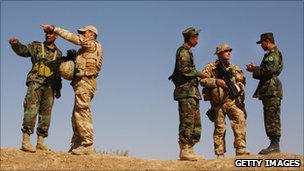 Afghanistan's President Hamid Karzai has named seven areas of the country which will pass from control by foreign troops into Afghan hands from July.
Afghanistan's President Hamid Karzai has named seven areas of the country which will pass from control by foreign troops into Afghan hands from July.
They are the relatively peaceful provinces of Kabul, Panjshir and Bamiyan and the cities of Herat, Mazar-e-Sharif, and Mehterlam.
But he also named Lashkar Gah, capital of the volatile Helmand province.
The handover is seen as a critical step in a transition of power before foreign troops end combat operations in 2014.
"The people of Afghanistan don't want that foreigners take responsibility for security any more," President Karzai said.
This is the first step in a long process of withdrawal, which will begin in July when the first tranche of foreign troops is set to leave Afghanistan.
After that, in these areas, the primary role of foreign troops will be the training and equipping of Afghan security forces, he said. Nato troops will cease to engage in battle.
Transition 'risk'
Speaking at the National Military Academy in the capital, Kabul, President Karzai was keen to stress the entrenched nature of the commitment: "Transition means taking responsibility for both security and development."
President Karzai said that the handover would eventually be extended to individual districts outside of the cities named. The entire province of Kabul, including the capital of the country would come under Afghan control - but the restive district of Surobi would remain in foreign hands.
"Afghanistan has been burning for 32 years," President Karzai said.
He also said that the war against terror should not be fought in Afghanistan's villages but should be taken to the havens and sanctuaries of the insurgents.
But he also urged militants to join peace negotiations.
"I once again urge the armed opposition to stop their attacks and killings and join the peace process," he said.
The BBC's Quentin Sommerville in Helmand, which has seen the worst of the violence over the years, says that despite rising casualty numbers, the surge of extra American troops and tens of thousands of new Afghan police and soldiers have improved security in a number of areas in the country.
But, our correspondent says, this transition comes with a risk.
Although much improved, the quality of Afghan police and soldiers is patchy - and many people fear they will be unable to withstand a renewed summer offensive from the Taliban, our correspondent says.
Lashkar Gah in the insurgency-wracked province of Helmand has been the focus of a massive coalition operation to rid the area of militants.
But analysts say that it is only to be expected that these areas will once again be the focus of a lot of activity as the Taliban will be planning to seize them back.
Despite advances in security in certain parts of the country, a record number of civilians and security personnel were killed in Afghanistan last year. More than 2,700 civilians were killed in 2010 - up 15% on the year before.
A UN report on civilian deaths said that the Taliban were responsible for 75% of all deaths. The proportion killed by Afghan and Nato forces fell, accounting for 16% of civilian deaths.



